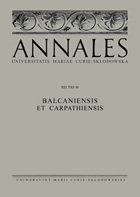The Predominance of Hungarian Executive Power over the Legislative and Judiciary Authorities from the Perspective of Illiberal Democracy (2010–2021). A Neo-Institutional Approach
The Predominance of Hungarian Executive Power over the Legislative and Judiciary Authorities from the Perspective of Illiberal Democracy (2010–2021). A Neo-Institutional Approach
Author(s): Sebastian KubasSubject(s): Governance, Government/Political systems
Published by: Wydawnictwo Naukowe Uniwersytetu Marii Curie-Sklodowskiej
Keywords: Hungary; institutions; separation of powers; illiberal democracy;
Summary/Abstract: The article analyzes the problem of limiting the competences of the Hungarian legislative and judiciary at the expense of the increase in the significance of the executive after 2010 . Although the Fundamental Law provides the rule of the separation of power, Viktor Orbán and his party, using their position in the parliament and government, limit the autonomy of the judiciary and legislative authorities . From the methodological perspective, the analysis is embedded in the neo-institutional approach and derives from the concept of the mechanism of democracy regres- sion proposed by Gerschewski . The main question posed in the article refers to the trajectory of limiting the autonomy of the judiciary and legislative power in Hungary after 2010 .
Journal: Annales Universitatis Mariae Curie-Sklodowska, sectio M – Balcaniensis et Carpathiensis
- Issue Year: 8/2023
- Issue No: 1
- Page Range: 49-72
- Page Count: 24
- Language: English

